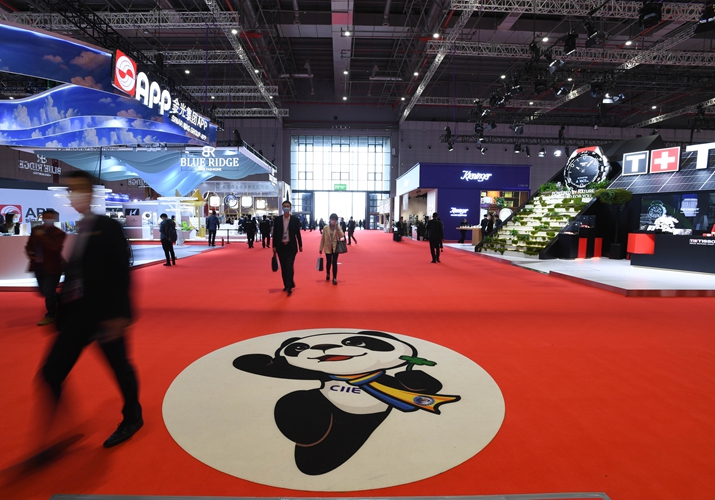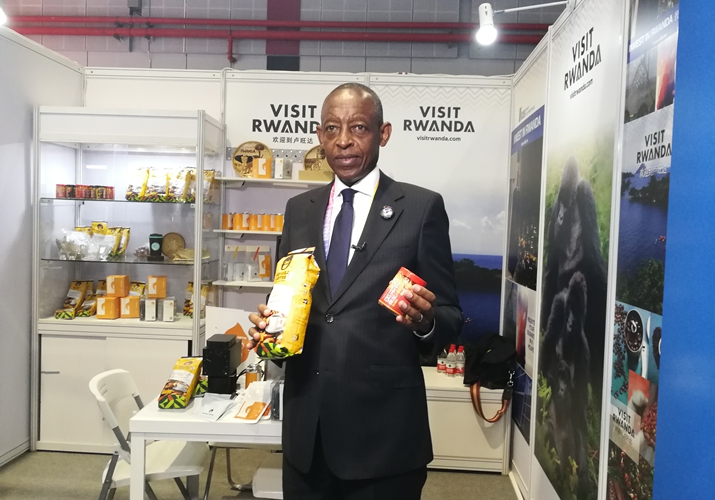
People visit the consumer goods zone of the Third CIIE on November 10 (XINHUA)
At the Food and Agricultural Products area of the Third China International Import Exhibition (CIIE), a thatched booth stands out. African honey, sold by Zambia Mpundu Wild Honey, is causing a sensation. This is the third year for the company to participate in this fair.
Established in Zambia in 2015, it is the only African company authorized to export honey to China. Thanks to the CIIE, the company concluded a contract worth 110 million yuan ($16.6 million) with a Chinese agent on November 6. "More orders mean increased production and increased income for our Zambian employees," said Zhang Tongyang, Product Manager at Zambia Mpundu.
As a platform for shared opportunities, the CIIE, which took place on November 4-10 and was being held for the third consecutive year, sent a positive message about China's strong commitment to opening its vast market even further to the international community.
This year's CIIE took place at a time when the COVID-19 pandemic has devastated the global economy in 2020. "It demonstrates China's sincere desire to share its market opportunities with the world and contribute to global economic recovery. Through the CIIE and other platforms of opening up, we will continue to support companies from around the world in exploring business opportunities in China," Chinese President Xi Jinping said via video link at the opening ceremony.
Two-way investment
For the past three years, the CIIE has helped exhibited products find buyers and exhibitors find investment opportunities.
On November 6, a large-scale trade and investment conference was held in the exhibition hall, where online and offline negotiations between exhibitors and Chinese and foreign traders took place. Zhang took part in it with the firm intention of finding buyers for his honey.
After a brief presentation and a quick negotiation, a company from Jiangsu Province in east China expressed its intention to purchase the equivalent of 10 million yuan ($1.5 million) of honey. Zhang, who signed several purchase orders in less than 90 minutes, was astonished by this high success rate.
According to the organizer, the conference is an excellent opportunity to find the right business partnerships and promote two-way investment.
A total of 674 exhibitors and 1,351 buyers from 64 countries and regions participated, with 861 letters of intent to cooperate being signed. An example of the speed of transactions at the CIIE was illustrated by a letter of intent to purchase $1 million worth of products signed in less than five minutes between Le Burg Liquid, an exhibitor from South Africa, and Optoauto high-tech company headquartered in Wuxi, Jiangsu Province.
The CIIE has also provided its facilities to Chinese and foreign industrial parks to attract investment and promote cross-border cooperation. Nearly 30 industrial parks, large companies, and foreign trade organizations from Zambia, Australia, Hungary, Thailand, and other countries have conducted investment promotion activities using prerecorded videos.
This year, the CIIE achieved another remarkable result: cumulative one-year forecast transactions totaled $72.62 billion, an increase of 2.1 percent compared to that in 2019.
"The Chinese market encompasses both exports and imports. It's not just good for one country; it's good for the whole world. It's inclusive, open and more balanced," Winnie Natala Chippendale, Zambia's ambassador to China, told ChinAfrica.
James Kimonyo, Rwanda's ambassador to China, promotes his country's products on the Rwandan stand at the third CIIE (GE LIJUN)
Opportunities for Africa
The CIIE offers an exceptional opportunity for African companies to explore the Chinese market and promote their exports by entering into partnerships, said Afar Rais, Commercial Director of IntelCare, a Moroccan cosmetics company that attends the fair every year.
IntelCare's objective is to become a leading company in the Moroccan cosmetics sector and make its brand name internationally renowned. Rais said that the CIIE offered her company a great platform to present its products, help Chinese consumers understand the brand and find long-term partners.
According to François Gamet, Director of the Standard Bank Group in Asia, the CIIE has helped China expand its import sources and has stimulated trade between China and Africa. "For some African firms, current productivity cannot meet demand, and the only way to match Chinese orders is to increase production. So you can imagine the benefits of the CIIE for African companies," he told CGTN.
This year, the Rwandan chili sauce also introduced its new packaging. Following the first CIIE in 2018, Alibaba's Hema Fresh retail platform and the Rwanda Development Board signed a memorandum of cooperation to promote Rwandan products into the Chinese market-based within the framework of Alibaba's Electronic World Trade Platform (eWTP) initiative.
In January and September 2019, the Hema Fresh team visited Rwanda twice, and in October, the order from Hema Fresh gave the chili pepper a chance to become an industry, and the chili pepper craze swept the whole territory of Rwanda. Some young people who grew up in the Internet era returned to their hometowns to grow chili peppers and became farmers in the digital economy era. Previously, they worked at different construction sites, earning less than 10 yuan ($1.5) per day. Since the outbreak of COVID-19, in order to meet the demand of Chinese consumers, Hema Fresh has made three additional orders with Rwandan producers, purchasing more than 60 tons of peppers. The third edition of the event proved again to be a success. More Chinese consumers learn about Rwandan chili sauce.
"China is appealing directly to us by inviting us to bring our products and take advantage of the opening of its market. Chinese investments are crucial to us. China is increasing investment by opening up its domestic market," said James Kimonyo, Rwanda's ambassador to China.
The CIIE is the largest import exhibition in the world. It is an opportunity for companies from around the world to connect with the Chinese market, and for Chinese companies to forge ties with foreign companies, said South African President Cyril Ramaphosa via video link at the opening ceremony.
Data from the Ministry of Commerce shows that in 2019, Sino-African trade reached $208.7 billion, 20 times more than that in 2000. China has been Africa's largest trading partner for 11 consecutive years.
(Print Edition Title: A Shared Development)
Comments to glj@chinafrica.cn

